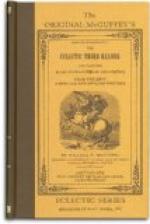[Indian Warfare]
The next year McArthur, McGuffey and George Sutherland were again sent out by General Wayne to spy the Indians. When only seven or eight miles from Wheeling and west of the Ohio river, they came upon a trail which led to a deer lick. Just at dusk McGuffey, who was leading the party, saw in the path the gaily decorated head-dress of an Indian. It had been placed there by the Indians who were in ambush close by and were ready to shoot any white man who should stop to pick it up. McGuffey saw through the stratagem instantly; without halting, he gave it a kick and shouted “Indians!” Several Indians fired at once and one of the balls smashed McGuffey’s powder horn, and passed through his clothing, but did not wound him. The three scouts retreated in safety, and the Indians did not follow them.
The wars with the Indians in that region closed in 1794, and Alexander McGuffey then married Anna Holmes, of Washington county, and became a settler. His eldest son was William Holmes McGuffey. When this son was but two years old the family moved to Trumbull county, Ohio. Here, in the care of a pious mother and father, he spent the years of childhood and of early manhood, performing the labors falling upon the eldest son in a large family of children dwelling in a log cabin on the frontier. From the heavy forest, fields were cleared, fenced and cultivated, roads were made and bridges were built, and in all these labors the sturdy son of the famous Indian scout took part.
[A Frontier School]
During the first eighteen years of W.H. McGuffey’s life he had no opportunities for education other than those afforded by the brief winter schools supported by the voluntary subscriptions of the parents in the neighborhood.
In 1802 Rev. Thos. Hughes, a Presbyterian clergyman, built at Darlington, Pa., the “Old Stone Academy” for the education of young men, having obtained the necessary funds by traveling on horseback throughout Pennsylvania and eastward even to Newburyport, Mass.
This seminary of learning was conducted on lines of the utmost economy to meet the needs of the boys living on the frontier. The tuition was only three dollars a year and the charge for board was seventy-five cents a week. The food was simple. For breakfast, bread, butter, and coffee; for dinner, bread, meat, and sauce; for supper, bread and milk. The only variation allowed in this bill of fare was the occasional omission of sauce or coffee.




